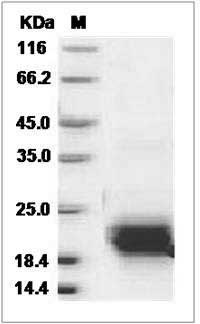-
Product Name
Rat VEGF-C (aa 108-223, His Tag) recombinant protein
- Documents
-
Description
Vascular endothelial growth factor C (VEGF-C) is a member of the VEGF family. Upon biosynthesis, VEGF-C protein is secreted as a non-covalent momodimer in an anti-parellel fashion. VEGF-C protein is a dimeric glycoprotein, as a ligand for two receptors, VEGFR-3 (Flt4), and VEGFR-2. VEGF-C may function in angiogenesis of the venous and lymphatic vascular systems during embryogenesis. VEGF-C protein is over-expressed in various human cancers including breast cancer and prostate cancer. VEGF-C/VEGFR-3 axis, through different signaling pathways, plays a critical role in cancer progression by regulating different cellular functions, such as invasion, proliferation, and resistance to chemotherapy. Thus, targeting the VEGF-C/VEGFR-3 axis may be therapeutically significant for certain types of tumors.
-
Protein name
Vascular endothelial growth factor C
-
Uniprot ID
O35757
-
Gene Name
Vegfc
-
Source/Expression Host
Human Cells
-
Expression Plasmid/cDNA
A DNA sequence encoding the rat VEGFC (O35757) (Ala108-Arg223) was expressed, fused with a polyhistidine tag at the C-terminus.
-
Protein Species
Rat
-
Molecular weight
The recombinant rat VEGFC comprises 127 amino acids and predicts a molecular mass of 14.5 kDa.
-
Purity
> 95 % as determined by SDS-PAGE
-
Activity
1. Immobilized rat VEGFC-His at 10 μg/mL (100 μL/well) can bind mouse VEGFR3-Fc (cat:502816), The EC50 of mouse VEGFR3-Fc (cat:502816) is 17.4-40.6 ng/mL.
2. Measured in a cell proliferation assay using human umbilical vein endothelial cells (HUVEC). The ED50 for this effect is 30-150ng/mL. -
Validations

Rat VEGFC / VEGF-C Protein (aa 108-223, His Tag) SDS-PAGE
Related Products / Services
Please note: All products are "FOR RESEARCH USE ONLY AND ARE NOT INTENDED FOR DIAGNOSTIC OR THERAPEUTIC USE"
